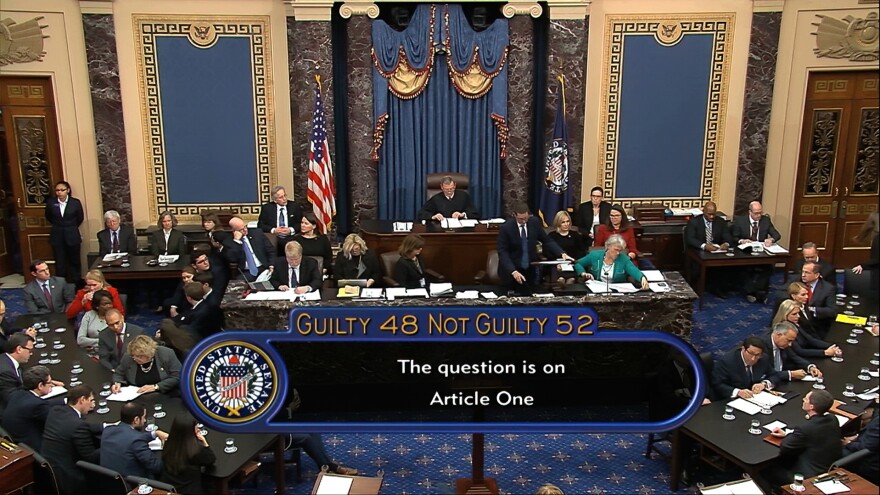Impeachment of the president has reared its head five times in American history, and all five episodes should serve as cautionary tales for those House Republicans who now seem determined to make it six.
Each of these earlier forays had a profound impact on the direction of national politics, both in the short term and for years to come.
Four of the five reached the point of impeachment votes in the House and trials in the Senate that failed to muster the two-thirds vote required to convict.
The one process that did not go the distance ended just before the House took its vote. It stopped because the target president, Richard M. Nixon, had resigned and left town. That was the only impeachment process that actually drove a president from office, and arguably the only one that clearly succeeded in what it set out to do.
It is not yet clear that the "impeachment inquiry" announced last week by Speaker Kevin McCarthy will even lead to formal charges or a vote in the House. But McCarthy said several House committees would get to work on allegations involving President Biden's conduct. The allegations concern his time as vice president under President Barack Obama but extend to more recent actions and associations, mostly having to do with his son, Hunter.
The implication of the questions asked has been that President Biden himself received money from Ukrainian or possibly Chinese sources in exchange for wielding his influence over U.S. policy as it affected those countries. This has been alleged, without evidence, by purported whistleblowers with varying degrees of credibility problems of their own.
McCarthy, who earlier this month vowed he would never begin such a probe without a majority vote of the whole House, insisted he had been forced to take this step on his own by "new revelations" that had created a new set circumstances.
McCarthy was making a frank admission and also stating a plain fact: Impeachments are largely the products of political circumstances. Previous instances of presidential impeachment have each had their own contexts, each unique to their own political moments. And these considerations have mattered as much as – if not more than – the specific "high crimes and misdemeanors" cited as impeachment criteria by the Constitution.
Trump cases illustrate potency of political contexts
Surely few would deny that both the 2019 and 2021 impeachment proceedings against former President Donald Trump were steeped in the toxic, partisan environment of his final years in office. The first was focused on Trump's delaying the delivery of Congressionally-appropriated military aid to Ukraine, which was arming itelf against Russian aggression.
But Democrats had been talking about impeaching Trump from the days immediately after winning the majority in November 2018. The initial impetus had been the expectation that the investigation of Russian interference in the 2016 election by former FBI Director Robert Mueller would implicate Trump or accuse him of obstructing Mueller's probe. In the end, while Mueller found evidence of Russian interference, he neither implicated nor exonerated Trump. He determined it was up to Congress to hold the president to account for any misdeeds.
Into this temporary void fell the news of a National Security Council official who raised concerns, within the administration, about the contents of a phone call Trump made in the summer of 2019 to Volodymyr Zelenskyy, the newly elected president of Ukraine. Zelenskyy was eager to get the promised military aid that had been authorized and appropriated by Congress in legislation Trump himself had signed.
Yet here was Trump on the phone suggesting the aid would await "a favor" – the announcement of a corruption probe by Ukrainian officials into allegations against Hunter Biden and his father.

Then-Speaker Nancy Pelosi announced an inquiry and months of House hearings and floor debate followed. Trump would be impeached in December 2019 by a House Pelosi's Democrats controlled and acquitted in February 2020 by a Senate with Republicans narrowly in control.
Trump was also impeached in the aftermath of the Jan. 6, 2021 attack on the Capitol, which followed his same-day rally near the White House and his incendiary exhortation to the crowd about fighting the result of the 2020 election he had lost by seven million votes. The Democratic-majority House impeached Trump for this immediately, but a majority vote in the Democratic-controlled Senate fell short of two-thirds.
Trump had already left office when this took place, but a conviction could have resulted in another vote to bar him from federal office for life. As it happens, he is not only eligible for another term but the heavy favorite to be his party's nominee for one in 2024. This is true despite his facing a total of 91 criminal counts in two state courts and two federal courts. Any or all of these could come to trial over the next year.
In that sense, Trump's impeachments have continued to matter if only because he wears them as badges of grievance. In the days before McCarthy's announcement, Trump had published a social media post instructing the House to go after Biden: "Impeach the bum or fade into oblivion."
The 'ick' factor in the Clinton case
Before Trump, the last president impeached was Bill Clinton, who was in his second term when an independent counsel investigating other matters found evidence that Clinton had a sexual affair with a 22-year-old White House intern that started in his first term. That evidence was brought forward in 1998 by Republicans in control of the House and dominated subsequent impeachment hearings and votes in the House Judiciary Committee. In the actual impeachment charges, Clinton was accused of lying to a federal grand jury and obstructing the special counsel's investigation.

While Clinton was widely pilloried for his behavior, and lying about it, the impeachment itself was far from popular, and the otherwise sanguine Republicans were stunned when they lost a handful of House seats in the November 1998 midterm elections. Nonetheless, they proceeded to the final House vote on impeachment in December. Clinton was tried before the Senate, also under Republican control, in February. One impeachment count got a majority but not nearly two-thirds, the other failed on a tie vote of 50-50.
Clinton had seen his poll numbers rise at each crucial point in the process, and remained popular in polls to the end of his second term in 2001. The economy at the time was booming, with inflation low and employment and stock prices high. The House Republicans had problems of their own, ousting their controversial firebrand Newt Gingrich after two terms as speaker and struggling to choose a replacement.
Looking further back for precedents
Clinton was only the second president actually impeached, because the Nixon process was short-circuited in 1974. The House Judiciary Committee had recommended impeachment but the House had not yet voted in August of that year. The U.S. Supreme Court unanimously denied Nixon's last-ditch attempt to withhold evidence (tape recordings he had made of Oval Office conversations) and a contingent of senior Republican senators went to the White House to tell Nixon the votes were there to convict him in the Senate (conservative icon Barry Goldwater of Arizona told him his vote would be among them).
Nixon resigned the next day and left town. But as scarlet as his offenses seemed then, it is important to remember there were political circumstances at play throughout the two-year process that exposed him. Yes, he had won his second term in 1972 in a 49-state landslide, but in the months that followed the outlook for many Americans darkened notably.
The winding down of the Vietnam War was empowering a Communist takeover in that embattled land, a dispiriting outcome for Americans – especially the families of that war's dead and wounded. The Yom Kippur War of October 1973 pitting Israel against its Arab neighbors had brought the world's superpowers to the brink of nuclear confrontation. It had also triggered the Arab oil embargo that quadrupled the price of oil and introduced Americans to the phrase "energy crisis" and the sight of long lines of cars waiting outside gas stations. Inflation was taking off. It would take a decade of economic pain to bring it back under control.
Andrew Johnson's 1868 impeachment
The only other example of impeachment that U.S. history offers is a distant one, yet it provides a further illustration of how political circumstances can be as important as a president's actual misdeeds. When Andrew Johnson was impeached in 1868, the context was the tragedy of Abraham Lincoln's assassination and the whole sorrowful saga of the American Civil War.
Johnson was a North Carolina-born Tennessean who was added to Lincoln's ticket in 1864 as a "Union Democrat" who had never joined the secessionists but was thought to have appeal for voters weary of the war in its fourth year. Johnson became vice president in March 1865 and had been there just six weeks when Lincoln was shot.
He was soon enmeshed in a war with the hardcore Northern senators who were zealous about freeing the formerly enslaved but also bent on punishing the vanquished South. He issued a blanket amnesty for veterans of the Confederate Army, then vetoed the Freedmen's Bureau bills that protected the political rights of the newly emancipated. Congress responded with the monumental 14th and 15th Amendments to the Constitution, enshrining those voting rights in the Constitution.
The long-running feud reached its culmination when Johnson tried to replace Edwin Stanton, who had been Lincoln's highly influential Secretary of War. Stanton had actively opposed Johnson on Reconstruction issues, allying himself with the hardcore Republicans on Capitol Hill. The Stanton battle went several rounds of suspending, restoring, firing and replacing until the Republicans in the House finally moved to impeach Johnson.
Most of the 11 charges dealt with alleged violations of the Tenure of Office Act, but there was also a "kitchen sink" aspect. Article 10, for example, accused the president of speechmaking "with a loud voice, certain intemperate, inflammatory and scandalous harangues."
The case moved to the Senate, where the extended debates on the Senate floor packed the galleries and sold many copies of the newspapers of the day. In May of 1868, the Senate voted on three of the charges and all three failed the two-thirds requirement by a single vote, 35-19. Among the holdouts were seven Republican "recusants," one of whom said Johnson was unacceptable but not worth destroying the "harmonious working of the Constitution."
Johnson sought the Democratic Party nomination for a term in his own right that summer. While he had the initial support of most of the Southern delegates at the convention, he fell far short of a majority on the first ballot and faded thereafter. That fall, the Republican nominee, Union war hero Ulysses S. Grant, was easily elected to the first of his two terms.
Johnson went back to Tennessee but achieved a brief return to the national stage in 1874 when that state's legislature elected him to the U.S. Senate. He died just a few months after taking that final office.
Copyright 2023 NPR. To see more, visit https://www.npr.org.





